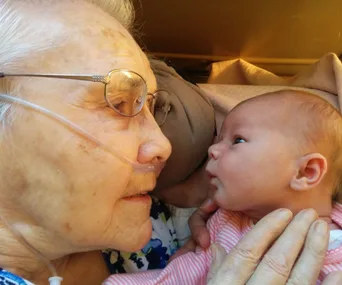The nine-month wait is over. As you look down at the tiny face gazing up at you, chances are it will be love at first sight. But don’t worry if you experience a mixture of emotions – for many new mums, exhaustion, combined with relief that their labour is over, overshadows everything else.
It’s perfectly normal for the first flushes of love to be delayed, especially if you’ve had a difficult birth. Here, we show you how to strengthen and enjoy that mummy-baby bond.
1. SKIN TO SKIN
Most babies today are placed on Mum’s chest as soon as they are born because health experts propound the importance of skin-on-skin contact as soon as possible. This means cuddling your baby against your bare chest,
so he hears your voice and heartbeat immediately after entering the world. However, if you can’t do this – because of complications or if you’ve had a caesarean – encourage your partner to do it instead.
Close contact with both parents will be important over the following weeks, too. Midwife Megan Baker, explains, “Babies just love to hear a reassuring heartbeat and feel the motion of their parents’ bodies.”
2. CHATTING
You might feel a little silly talking to your newborn, but your baby will simply love hearing your voice. “Research shows that babies in the womb start to hear voices as early as 24 weeks,” says Baker. “Just talking your baby through your daily routine will help the two of you to connect.”
Don’t think about what you’re saying – it’s not the words themselves but the soothing tone of your voice that really matters. “I actually tended to sing rather than talk to my son. When I was tired, I couldn’t think of what to say,” says Emily, 30, mum to Jack.
However you decide to spend those first few precious weeks with your baby, you’ll never recapture this amazing time, so dim the lights, turn off the phone, unplug the laptop, make yourself as comfortable as possible and settle in for invaluable family bonding.
3. ENJOY THE DOWNTIME
A blank diary can be a scary prospect, especially if you enjoy being busy. But your priority for the first few weeks is to get to know your baby and this is best done without a stream of visitors.
“Spending time learning the ways your baby tries to express herself will be incredibly important,” advises Megan.
Anna, 32, mum to Grace, says, “When my daughter was born, I was on a mission to show everyone my life wasn’t going to stop, so I was constantly out and about or having friends over. Looking back, I wish I’d relaxed and spent more time on the couch just admiring my new daughter.”
4. BATH TIME
Even cranky babies relax in warm water, making it prime bonding time. “Our son has always been fascinated by water,” says Sarah, 29, mum to Ollie. “In fact, he’s such fun in the bath that my husband took responsibility for washing duties. He gets in the water with Ollie, and I get five minutes’ rest.”
As long as you don’t mind a slightly cooler bath than the temperature you would prefer (test it on your wrist first), it’s fun to get in with your baby. You’ll need to be more prepared if you want to do this, so have a towel and bub’s clothes within easy reach.
As babies get cold quickly, dress him first with the nappy, singlet and jumpsuit you’ve already laid out.
5. MASSAGE
“This is about getting in tune with your baby, as well as learning to soothe him with touch,” says Baker. Signing up to a baby massage class can hone your technique, but engaging with your baby and working out what he does and doesn’t like is most important.
“Don’t worry too much about your technique,” she adds. “Just try gently massaging different parts of your baby’s body and see what he responds to the best. You’ll soon grow in confidence.”
And you don’t need special oils; in the early days, a vegetable-based oil will do. Later, choose natural oils with scents that relax and soothe, like lavender.
6. FEEDINGS
There’s nothing quite like nourishing your baby to induce a rush of maternal love, and breastfeeding him stimulates the production of the bonding hormone oxytocin. “It floods your body with waves of happiness when your baby attaches,” explains Baker.
7. SIGHT & SMELL
Your baby will recognise you by scent before he’s able to see you properly. “Babies have a keen sense of smell – they are quickly able to identify both parents,” says Baker. For this reason, don’t wear any perfume: let your baby get to know your natural scent instead.
And don’t worry if your loving looks aren’t reciprocated, says Baker. “For the first few weeks, everything a baby sees will be blurry, but it’s worth getting into the habit of making eye contact.
The earlier you start communicating this way – looking him directly in the eyes and watching for cues that indicate how he’s feeling – the easier you will find the bonding process.”

